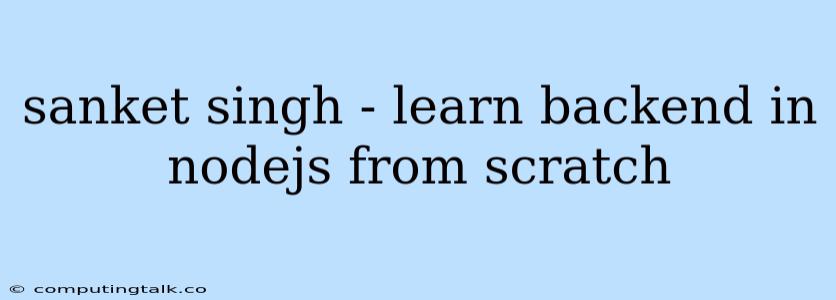Embark on Your Backend Journey with Node.js: A Beginner's Guide
Are you eager to dive into the world of backend development and build robust, dynamic applications? Look no further than Node.js, a powerful JavaScript runtime environment that empowers you to create scalable and efficient server-side applications. This guide will walk you through the fundamentals of Node.js, providing a comprehensive roadmap for beginners.
What is Node.js?
Node.js is built on Chrome's V8 JavaScript engine, enabling you to execute JavaScript code outside of a web browser. Its event-driven, non-blocking I/O model makes it ideal for handling high-concurrency applications, such as real-time chat systems or API servers.
Why Learn Node.js?
- JavaScript Everywhere: Leverage your existing JavaScript knowledge to develop both frontend and backend applications.
- High Performance: Node.js excels at handling concurrent connections, making it perfect for building scalable applications.
- Large Community: A vast and active community provides ample support, libraries, and frameworks.
- Versatile: From web applications to command-line tools, Node.js empowers you to build a wide range of applications.
Getting Started with Node.js
-
Installation: Download and install Node.js from the official website. It includes the Node.js runtime and npm (Node Package Manager), essential for managing packages and dependencies.
-
Project Setup: Create a new project directory and initialize it with npm:
mkdir my-node-app
cd my-node-app
npm init -y
- Your First Node.js Program: Create a file named
app.jsand write your first Node.js code:
const http = require('http');
const hostname = '127.0.0.1';
const port = 3000;
const server = http.createServer((req, res) => {
res.statusCode = 200;
res.setHeader('Content-Type', 'text/plain');
res.end('Hello World\n');
});
server.listen(port, hostname, () => {
console.log(`Server running at http://${hostname}:${port}/`);
});
- Run your Application: Open your terminal and run:
node app.js
Key Concepts in Node.js
- Modules: Node.js relies on modules for code organization and reusability. The
require()function loads modules into your application. - Event Loop: Node.js utilizes an event loop to handle asynchronous operations efficiently. This enables your application to continue processing requests while waiting for long-running tasks to complete.
- Callbacks: Functions passed as arguments to asynchronous operations, allowing you to handle their completion or errors.
- Promises: A modern approach to handling asynchronous operations, providing a cleaner and more readable way to manage promises.
Common Node.js Frameworks
- Express.js: A popular web framework that simplifies building robust web applications.
- NestJS: A powerful framework based on TypeScript, offering a highly structured and scalable approach to development.
- Koa.js: A lightweight and flexible framework built on top of ES7 async/await syntax.
Beyond the Basics: Expanding Your Node.js Knowledge
- Databases: Learn to integrate Node.js with popular databases such as MySQL, MongoDB, and PostgreSQL.
- REST APIs: Develop RESTful APIs to expose data and functionality to other applications.
- Authentication and Authorization: Implement secure authentication and authorization mechanisms for your applications.
- Deployment: Deploy your Node.js applications to various platforms like Heroku, AWS, and Google Cloud Platform.
Tips for Learning Node.js
- Practice Regularly: The best way to master Node.js is to build projects and practice coding.
- Explore Open Source: Contribute to open-source projects to gain hands-on experience and learn from experienced developers.
- Online Resources: Utilize platforms like freeCodeCamp, Udemy, and Coursera for comprehensive learning resources.
- Join the Community: Engage with the Node.js community on forums and online groups for support and guidance.
Conclusion
Embarking on your Node.js journey opens doors to a vast world of backend development possibilities. With its powerful capabilities, extensive community, and wide range of applications, Node.js empowers you to build innovative and impactful software. As you delve deeper into the world of Node.js, remember to embrace the learning process, practice regularly, and seek guidance from the vibrant community.
